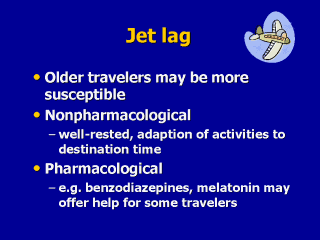 |
The elderly may be more
susceptible to jet lag. Jetlag results from crossing several time zones,
usually a time zone shift of more than 3-4 hours, which disrupts the body's
physiological and sleeping and waking cycle. This cycle is called the
circadian rhythm, which results in patterns of hormone secretion, body
temperature and the sleep-wake cycle. These are normally synchronised by
internal structures such as the hypothalamus and external cues.
the elderly intends to visit.
The symptoms of psychological and physiological
desynchronisation, termed ‘jet-lag’,
may include difficulty sleeping, fatigue, confusion, irritability, digestive
disorders, joint stiffness, headaches and impairment of sensorimotor
function.
Jet lag seems to be worst when traveling east, since the day is
shortened. |
